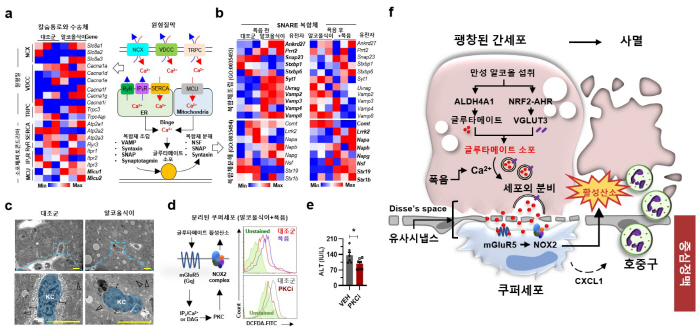Hepatocytes talk to immune cells during binge drinking? ...World's First Identification of Key Outbreak Mechanisms for Alcoholic Liver Diseases
|
The study is expected to provide an important clue to the establishment of a new treatment strategy for alcoholic liver disease, with 'hepatocytes secrete glutamate to communicate directly with immune cells and cause inflammation during binge drinking.
◇ First identification of inflammatory signaling between hepatocytes and immune cells triggered by binge drinking
The research team found that hepatocytes exposed to chronic drinking usually store glutamate in intracellular vesicles through VGLUT3 (vesicular glutamate transporter 3), and then rapidly release it due to changes in intracellular calcium concentration in binge drinking situations.
Of particular note, the secreted glutamate activates the mGluR5 receptor of Cooper cells, a macrophage in the liver, causing reactive oxygen species production and inflammatory reactions through NADPH oxidase 2 (NOX2). Furthermore, it was confirmed that alcohol-swelled hepatocytes strengthen physical contact with Cooper cells, forming 'pseudosynapse' similar to synapses between nerve cells.
Professor Yang explained that "this is the first study to show direct physical and functional communication pathways between hepatocytes and immune cells.".
◇Verify the mechanism by analyzing clinical patient samples and pay attention to it as a therapeutic target
This study is more significant in that the results presented through animal models and cell experiments were clinically verified using blood and liver tissue samples from domestic alcoholic hepatitis patients.
In patients with alcoholic liver disease, elevated blood glutamate levels, increased VGLUT3 expression, and induction of inflammatory cytokines were clearly identified, suggesting that this pathway is closely related to actual clinical disease expression.
More encouragingly, the team confirmed that hepatitis and hepatocellular damage were significantly alleviated when VGLUT3 or mGluR5 was inhibited by genetic and pharmacological methods. This strongly suggests that this pathway may be a promising therapeutic target for alcoholic liver disease.
Professor Yang Kyung-mo "This study newly identified that glutamate metabolic regulation in hepatocytes is involved in direct inflammatory communication mechanisms with immune cells beyond simple metabolic functions." he said.
"We look forward to the development of early diagnostic biomarkers based on this route or drug-targeted treatment strategies in the future."In particular, it will be possible to develop early diagnostic methods through blood glutamate concentration measurements and develop new treatments targeting VGLUT3 or mGluR5."
The results of this study were published in the July 2025 issue of Nature Communications (IF 15.7).
|
This article was translated by Naver AI translator.





